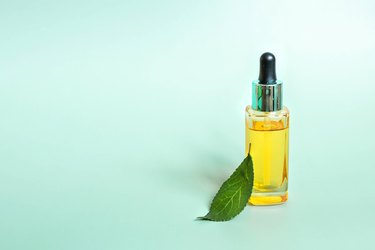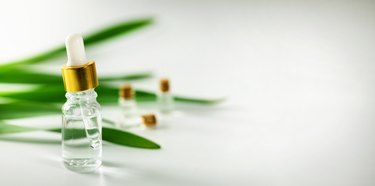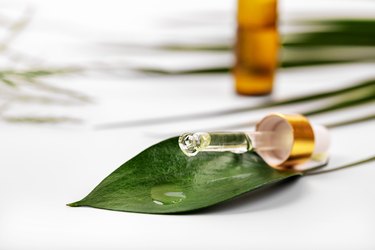
Using tea tree oil on plants is a natural way to control pests and fungus in your garden. Tea tree oil is an essential oil made from the leaves of the Australian melaleuca tree (Melaleuca alternifolia). While there are many different cultivars of melaleuca, only the Australian version produces foliage that has medical and pharmacological uses, and some have germicidal and antibacterial properties. Tea tree oil is non-toxic when used topically; mix it with vegetable oil to provide a safe and effective oil that can help eradicate insects and control fungus outbreaks.
History of Tea Tree Oil
Video of the Day
Often referred to as a "medicine cabinet in a bottle," tea tree oil is widely used as a medicine, skin treatment and an anti-fungal treatment on humans and plants. The medicinal version of the Melaleuca was discovered in Queensland and New South Wales, Australia. Captain James Cook observed indigenous peoples using the vapor steamed from the leaves to treat congestion, making a strong brew that smelled similar to nutmeg – hence the name "tea tree."
Video of the Day
The oil has long been used topically to treat skin irritations, while sailors, ever on the lookout for brews, made beer from the leaves. Australian soldiers in World War II carried tea tree salve to treat wounds and fungus infections, and producers of tea tree oil were exempt from the draft so didn't have to serve in the armed services. Until penicillin was discovered, tea tree oil was often used to combat infections.
Tea Tree Oil as an Insecticide

Tea tree oil is a natural insecticide, but be sure to test your mixture on a single leaf to see if it harms your plant. Tea tree is a strong oil and needs dilution to ensure it doesn't negatively impact vegetation, but when mixed in the proper ratio, is effective at deterring insects. The indigenous tribes of Australia used to inhale the tea tree oil fumes to combat colds and coughs. In agriculture, the leaves are steamed to produce the oil, and a solution of oil and water is made for agricultural purposes.
To deter mosquitos, mix 1 cup of grain alcohol with 2 1/2 teaspoons of tea tree oil. When combating flies, mix 1/2 cup witch hazel, 1/2 cup apple cider vinegar and 30 to 50 drops of tea tree oil. Ants are repelled when you mix 1/4 cup purified water, 1/4 cup vodka, 15 drops of tea tree oil, and 7 drops of oil from any citrus.
Tea Tree Oil as a Fungicide

Tea tree oil has antimicrobial and antifungal properties, most likely due to its chemical composition of which the main component is terpinen-4-ol, according to the Mayo Clinic. For a fungicide on plants, mix 4 tablespoons of baking soda, 2 tablespoons of tea tree oil and a gallon of water to control mildew.
For a larger quantity, use the same ratio. Do not spray in the hot sunshine; dusk is best. Saturate the leaves and wait. If it's pollinating season, just know that the tea tree oil mixture won't harm bees.